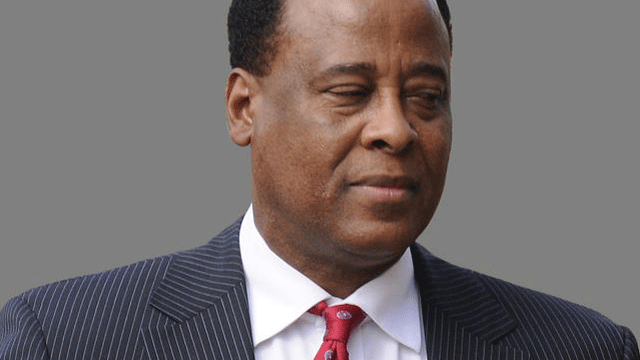
Dr. Conrad Murray (AP)
LOS ANGELES – Michael Jackson's family believes involuntary manslaughter charges against the pop singer's physician would be "just a slap on the wrist," attorney Brian Oxman said Wednesday.
Oxman told CBS' "The Early Show" that Dr. Conrad Murray displayed recklessness in dispensing powerful drugs to help Jackson sleep, warranting a second-degree murder charge. Involuntary manslaughter -- the charge prosecutors reportedly plan to seek -- carries a maximum jail sentence of just four years.
"That is just a slap on the wrist, and a slap in the face, because Michael Jackson was someone who we knew was in danger of being brought to his knees, brought his death, by the use of these medications," Oxman said.
Murray's attorney said the doctor is ready to surrender to authorities if prosecutors file charges. While there is no public timetable for charges to be filed against Murray, there are strong indications the move is imminent.
Murray, who has a practice in Houston, came to Los Angeles last weekend and spent Tuesday afternoon meeting with his newly assembled team of three lawyers. The district attorney's office has not said if it will file charges but lead defense attorney Ed Chernoff said Murray is ready for such a move.
"I haven't received any phone call from anybody asking for the doctor to surrender," Chernoff said. "If we get the call, we'll be happy to."
A law enforcement official last month told the AP that prosecutors had decided to seek a grand jury indictment on an involuntary manslaughter charge. On Tuesday, a second law enforcement official said prosecutors were sticking with the charge but planned to file a criminal complaint to avoid the appearance of secrecy in the closely watched case.
Both officials requested anonymity because they are not authorized to publicly discuss the case.
David Walgren, the deputy Los Angeles County district attorney handling the case, declined to comment.
Jackson, 50, hired Murray to be his personal physician as he prepared for a strenuous series of comeback performances in London. His death on June 25 in Los Angeles came after Murray, tending to Jackson in the star's rented mansion, administered the powerful anesthetic propofol and two other sedatives to get the chronic insomniac to sleep, according to the Los Angeles County coroner's office, which ruled the death a homicide.
Propofol is only supposed to be administered by an anesthesia professional in a medical setting. The patient requires constant monitoring because the drug depresses breathing and heart rate while also lowering blood pressure, a potentially deadly combination.
Murray, a cardiologist, has maintained from the outset that nothing he gave the singer should have killed him. Administering propofol to Jackson wasn't illegal, so prosecutors must show Murray deviated from accepted medical norms when he administered it in a non-medical setting while Jackson already had other sedatives in his system.
A criminal complaint would pave the way for a preliminary hearing in the case, where a judge would publicly hear evidence and decide if it should go to trial.
Such a hearing would provide a valuable glimpse into the strength of the government's case and could help Murray determine if he should negotiate with prosecutors for a plea deal, said criminal defense attorney Roger Rosen, who is not a part of the case.
"You get a flavor for what you are dealing with," he said.
Chernoff recently hired attorneys Joseph Low, who has worked in the media spotlight representing Marines accused of wrongful killings in Iraq, and J. Michael Flanagan, who represented Britney Spears in a hit-and-run case.
Los Angeles Police Department investigators spent months gathering evidence, with detectives talking to numerous medical experts to determine whether Murray's behavior, which included talking on his cell phone and leaving Jackson's bedside, fell outside the bounds of reasonable medical practice.
To bring a manslaughter charge, prosecutors must show there was a reckless action that created a risk of death or great bodily injury. If a doctor is aware of the risk, there might also be an issue of whether the patient knew that risk and decided to take it.
Murray was in dire financial shape when he signed on as Jackson's doctor, owing a total of at least $780,000 in judgments against him and other payments. Low declined to comment on what financial arrangements the lawyers had made to represent Murray.






